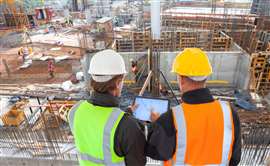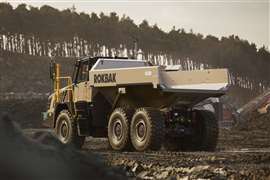Read this article in Français Deutsch Italiano Português Español
PwC: Construction leaders double down on AI, robotics and prefab
11 November 2025
More than half of construction and engineering executives plan to significantly increase spending on artificial intelligence and automation within the next three years, according to PwC’s Future of Industrials Survey 2025.
 A global survey of 500 executives shows growing investment in intelligent systems, modular methods and workforce transformation in engineering and construction. Image: Adobe Stock
A global survey of 500 executives shows growing investment in intelligent systems, modular methods and workforce transformation in engineering and construction. Image: Adobe Stock
The global study of more than 500 company executives found that 56% expect to ramp up AI investment, 42% will boost spending on robotics, and a third believe AI will have a transformative impact on client service and project delivery.
The findings provide insight into how the construction industry is being slowly reshaped by data, modularisation and automation.
The report argues that prefabrication and modular construction are becoming central to addressing labour shortages and cost volatility. By shifting work into controlled factory environments, firms are improving predictability, compressing schedules and cutting rework.
Some tools are currently already in use on construction sites, with the report highlighting layout robots that are compressing field-layout time from five days to one, while real-time analytics are reducing overall project durations by up to 15%. These technologies form a continuous feedback loop between site and design, enabling faster, safer and more precise delivery.
At the same time, construction supply chains are becoming more intelligent. Digital ‘control towers’ and predictive logistics systems are helping companies manage material volatility and improve visibility from factory to site. Many firms are also regionalising production to reduce lead times and strengthen resilience.
Workforce changes in construction
The growing use of technology is impacting construction’s workforce with prefab and automation creating demand for technicians, analysts and robotics operators alongside traditional trades. Nearly half of E&C firms now run reskilling programmes to help experienced workers adapt to digital roles.
Factory-based construction methods are also supporting sustainability goals. Modular builds can reduce waste and cut carbon emissions by about a third, while data tools track performance and maintenance throughout an asset’s life.
The report concludes that the future of capital project delivery will be defined by integration: connecting design, manufacturing, logistics and operations through a single digital thread. The leading firms, it says, will be those that “re-engineer delivery around data and workforce transformation – turning unpredictability into precision and pressure into performance.”
STAY CONNECTED


Receive the information you need when you need it through our world-leading magazines, newsletters and daily briefings.
CONNECT WITH THE TEAM











